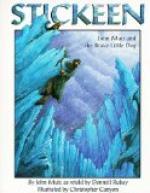While camp was being made, Joe the hunter climbed the mountain wall on the east side of the fiord in pursuit of wild goats, while Mr. Young and I went to the glacier. We found that it is separated from the waters of the inlet by a tide-washed moraine, and extends, an abrupt barrier, all the way across from wall to wall of the inlet, a distance of about three miles. But our most interesting discovery was that it had recently advanced, though again slightly receding. A portion of the terminal moraine had been plowed up and shoved forward, uprooting and overwhelming the woods on the east side. Many of the trees were down and buried, or nearly so, others were leaning away from the ice-cliffs, ready to fall, and some stood erect, with the bottom of the ice plow still beneath their roots and its lofty crystal spires towering high above their tops. The spectacle presented by these century-old trees standing close beside a spiry wall of ice, with their branches almost touching it, was most novel and striking. And when I climbed around the front, and a little way up the west side of the glacier, I found that it had swelled and increased in height and width in accordance with its advance, and carried away the outer ranks of trees on its bank.
On our way back to camp after these first observations I planned a far-and-wide excursion for the morrow. I awoke early, called not only by the glacier, which had been on my mind all night, but by a grand flood-storm. The wind was blowing a gale from the north and the rain was flying with the clouds in a wide passionate horizontal flood, as if it were all passing over the country instead of falling on it. The main perennial streams were booming high above their banks, and hundreds of new ones, roaring like the sea, almost covered the lofty gray walls of the inlet with white cascades and falls. I had intended making a cup of coffee and getting something like a breakfast before starting, but when I heard the storm and looked out I made haste to join it; for many of Nature’s finest lessons are to be found in her storms, and if careful to keep in right relations with them, we may go safely abroad with them, rejoicing in the grandeur and beauty of their works and ways, and chanting with the old Norsemen, “The blast of the tempest aids our oars, the hurricane is our servant and drives us whither we wish to go.” So, omitting breakfast, I put a piece of bread in my pocket and hurried away.
Mr. Young and the Indians were asleep, and so, I hoped, was Stickeen; but I had not gone a dozen rods before he left his bed in the tent and came boring through the blast after me. That a man should welcome storms for their exhilarating music and motion, and go forth to see God making landscapes, is reasonable enough; but what fascination could there be in such tremendous weather for a dog? Surely nothing akin to human enthusiasm for scenery or geology. Anyhow, on he came, breakfastless, through the choking blast.




